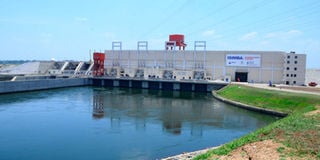Nine mini hydro dams in the pipeline - UECCC

Isimba dam that was commissioned in March this year. Uganda Energy Credit Capitalisation Company (UECCC) is implementing a programme through which nine mini hydro power projects for rural electrification are being developed. These are expected to improve the quality of electricity in rural areas.
PHOTO by Alex Esagala
What you need to know:
The Ministries of Energy and Mineral Development alongside that of Finance, Planning and Economic Development own the Uganda Energy Credit Capitalisation Company (UECCC) on behalf of the Government of Uganda. Prosper Magazine’s Rainher Ojon, talked to Ms Specioza Ndagire Kimera, the managing director of UECCC, about the role of the energy credit capitalisation company within the context of expanding access to clean renewable energy for Uganda’s fast growing rural and urban population. Excerpts below.
The Ministries of Energy and Mineral Development alongside that of Finance, Planning and Economic Development own the Uganda Energy Credit Capitalisation Company (UECCC) on behalf of the Government of Uganda. Prosper Magazine’s Rainher Ojon, talked to Ms Specioza Ndagire Kimera, the managing director of UECCC, about the role of the energy credit capitalisation company within the context of expanding access to clean renewable energy for Uganda’s fast growing rural and urban population. Excerpts below.
Tell us about the Uganda Energy Credit Capitalisation Company UECCC?
Our Vision is to be the leading provider of financing solutions and technical assistance to facilitate renewable energy development and access.
Our mission is to provide innovative financing initiatives and technical assistance that enables participation of the private sector and other stakeholders to enhance development and access to renewable energy.
We are also in place to provide credit support instruments including guarantees and lines of credit through selected participating financial institutions. This ensures reduction of perceived risks by the financial intermediaries as they support renewable energy projects.
UECCC is also the administrator of the Uganda Energy Capitalisation Trust, which is a framework for pulling resources from government and development partners and to channel the same towards renewable energy projects.
How does the public interface with what you do?
We operate through forming key stakeholders including all tiers of the financial sector such as Savings and Credit Cooperative Societies (Saccos), Micro finance Institutions (MFIs) and commercial banks. Some of these financial institutions includes Centenary Bank, Post Bank and Finance Trust Bank. Others are Pride Micro finance, Ebo Sacco and Tujijenge Sacco.
We also work through energy service providers. The idea is to ensure Ugandans have access to clean energy by acquiring technologies such as solar, domestic bio gas energy and on grid connections.
What are some of the interventions that you are making within the renewable energy space?
Since our commencement in the year 2009, we have successfully ensured the capitalisation of UECCC, from a mere Shs1.5 billion to the current capiatlisation of over Shs100 billion for financing our mandate which is to provide a reliable framework for pooling resources from government, investors and development partners and to channel the same to viable renewable energy projects.
We have also put in place customer-oriented financing modalities targeting the average Ugandan including loan products through both the regulated and grass root based financial institutions. These include the solar loan product. We also have the on grid connection loan product and this is to enable the ordinary Ugandan to acquire the on-grid electricity connection. We also have the domestic bio-gas loan product, to address the problem of deforestation. So we want the ordinary Ugandan to switch from the use of firewood to bio gas system and this utilises all forms of any organic stock including cow dung as key materials.
What about actual hydro energy projects?
We are also implementing a programme through which we are developing a cluster of nine mini hydro power projects for rural electrification. This will enhance the quality of power on the grid within the project areas by providing a localised source of electricity that will strengthen the quality of power in the project areas. Under this, we shall also be able to connect at least 71,000 last mile connections to members of the public by ensuring wider access for both household and commercial activities among communities.
What is the future outlook like?
We intend to increase our capitalisation base to offer more products. We have not yet addressed all the financing requirements for the renewable energy sector. We intend to mobilise resources to put in place a loan product for energy efficiency projects. This should enable project developers to switch from less efficient technologies to more efficient technologies. We also need to put in place a programme for financing early stage project developers particularly in undertaking pre-feasibility and feasibility studies. We hope to achieve this through growing our capitalisation base, with full support of development partners and the government of Uganda which is our major shareholder.
To our key partners the financial institutions out there, let us do business while taking care of the environment we operate in, by supporting financial products that we are offering. These will ensure that we are promoting clean energy technologies that don’t harm the environment.




